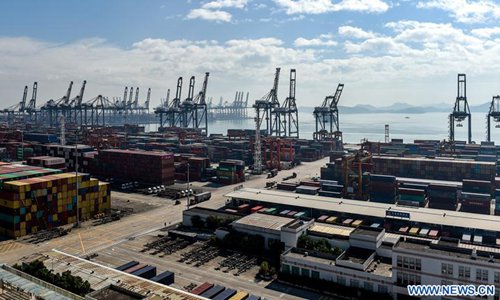
Aerial photo taken on November 29, 2017 shows a view of the Yantian Port in Shenzhen. This year marks the 40th anniversary of China's reform and opening-up policy. Photo: Xinhua
China will steadily advance its opening-up and reform policy at its own pace and the ongoing trade frictions with the US will only make China more determined to implement the policy, Chinese analysts stressed on Tuesday.
Facing a rising China and the trend of globalization, the US should drop its condescending attitude and stop arbitrarily imposing its values and rules on other countries, they said.
Liu Shijin, former vice president of the Development Research Center (NDC) under the State Council, China's cabinet, told an investment forum on Tuesday in Beijing that a high-quality market economy and high-level opening-up will help China better cope with frictions with the US and enhance China's domestic confidence, Caixin magazine, the host of the forum, reported Tuesday.
Liu pointed out that China's economy will shift from rapid growth to high-quality growth, and that as long as the country adheres to its target, it will play a leading role in global economic development.
Countering concerns that tit-for-tat tariff spat might overshadow China's further deepening of its reform and opening-up, Liu told the forum that China will "push ahead with those reforms on its own steam and not being forced by others," Reuters reported on Tuesday.
"The policy is based on a clear understanding of globalization," Ni Hongri, a research fellow with the Beijing-based DRC, told the Global Times on Tuesday.
A market economy based on high-quality growth and high-level opening-up can help China better communicate with countries that have different institutional systems and levels of development, Ni noted.
Recent interactions with countries in Southeast Asia and the promotion of free trade zones in China all indicate that China is resolute in following the path of opening-up, Ni stressed.
Chinese President Xi Jinping said at the opening ceremony of the APEC summit on Saturday that "we should say no to protectionism and unilateralism, uphold the WTO-centered multilateral trading system, make economic globalization more open, inclusive, balanced and beneficial to all."
To promote domestic firms' purchasing power on the international market, China held the country's first international import expo in Shanghai earlier this month, attracting more than 3,000 enterprises from more than 130 countries and regions.

A visitor views photos at the photo exhibition "China's economic reform - 40 years in the making" in New York on August 8. The photo exhibition showcases the achievements China has made since its reform and opening-up policy. Photo: Xinhua
The opening-up policy is driven by domestic needs and international trade, Zha Xiaogang, a research fellow at the Shanghai Institute for International Studies, told the Global Times on Tuesday. Zha said the US is struggling economically and politically under the Trump administration's conservative policies that have brought suffering to a great number of people.
Analysts noted that, while the US is attempting to alleviate domestic problems by promoting conservatism and pressuring other countries, China continues to promote its opening-up and cooperation to benefit mutual development.
The US should realize that institutional reforms are needed to ensure that the benefits of globalization are shared by the majority of citizens, not just the elites of the US, said Zha.
China and other countries should not be made scapegoats for the economic and social failures of the US, he noted.
Chinese Vice Premier Liu He on November 10 called on both China and the US to properly solve economic and trade issues under the guidance of the consensus reached by the two presidents and the principle of mutual respect, equality and mutual benefit.
Zha said that the two sides should keep in close communication to prevent trade frictions from expanding to other areas.
Xi and US President Donald Trump are expected to meet later this month at the G20 summit in Argentina, which analysts say could be an opportunity for the two sides to break the deadlock and make a breakthrough.
A breakthrough will be possible only if the US changes its arrogant and prejudiced attitude toward China, said Zha.
